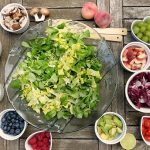If your aim is to lose weight, adopting a vegan diet may have crossed your mind. Vegans avoid consuming meat, fish, dairy, and eggs. They replace these with fresh fruits and vegetables, along with legumes, plant-based milks, meat substitutes, and other dairy-free options.
While ethical concerns for animals may lead some individuals to adopt a vegan lifestyle, recent research suggests that the diet can also present various health advantages, including a potential for significant weight loss.
Further investigation is required to clarify the process, but it is believed that adopting a vegan lifestyle could result in a decrease in the consumption of high-calorie foods. This is achieved by substituting these items with high-fiber options that are both low in calories and more satiating.
But is this approach healthy?
Eliminating essential food groups from your diet may appear detrimental to your health, and without proper consideration of your nutritional needs, it can be.
Certain individuals are concerned with meeting their daily protein intake and obtaining crucial nutrients, such as vitamin B-12. This specific essential vitamin is solely present in animal-derived products and insufficient amounts can lead to anemia. In order to prevent any deficiencies, vegans should include vitamins, vitamin-enriched cereals, and fortified soy products as part of their dietary regimen.
After transitioning to a vegan diet, some individuals may experience difficulties with fluctuating weight, commonly referred to as yo-yo dieting. This refers to a pattern of losing and then regaining a significant amount of weight, which may stem from difficulties adhering to a strictly vegan diet. Yo-yo dieting is known to have severe health implications, such as an elevated risk for heart disease and type 2 diabetes.
Although there may be various obstacles, it is possible to follow a healthy vegan diet and shed pounds. The essential approach, similar to any other dietary plan, is to emphasize nutrient-packed meals rather than those high in calories but lacking in nutrients. Some examples of nutrient-rich foods suitable for a vegan diet include:
- fresh fruits and vegetables
- whole grains
- beans and legumes
- nuts and seeds
Try to restrict or refrain from consuming vegan processed foods that comprise of these additives:
- fats
- sugars
- starches
- sodium
- food additives
Purium Sources for B12:
Tips for Weight Loss
To maintain weight, women require a daily calorie intake of about 2,000 calories, whereas if they want to lose weight, they must stick to around 1,500 calories. Men, on the other hand, need to consume around 2,500 calories each day to maintain weight and approximately 2,000 calories a day to lose weight.
When it comes to nutrition, a calorie from junk food cannot be equated to a calorie from whole food. Consuming a vegan snack like Nutter Butter cookies, even if it helps you stay within your calorie limit, cannot be compared to consuming large quantities of fresh fruits and vegetables.
Several variables influence weight loss, encompassing:
- age
- height
- current weight
- diet
- physical activity levels
- metabolic health
- other medical issues
While some factors are beyond your control, you have the ability to manage your diet and physical activity. Irrespective of the dietary preference you adopt, adhering to these tips for nutritious consumption is recommended.
1. Time Your Meals
Eating small amounts of food frequently throughout the day does not aid in weight loss. Proper timing of meals is crucial to increasing metabolism and developing healthy eating routines.
For the sake of routine, attempt to consume your meals at consistent times every day. Prioritize a substantial breakfast, and rearrange your schedule to make lunch earlier and dinner smaller.
Eating within 45 minutes of completing your workout can provide nourishment and recovery for your muscles.
At what time should you avoid eating? Within two hours of going to bed. Eating calories too close to bedtime is linked to gaining weight and having trouble sleeping.
READ MORE: Fasting Health Benefits
2. Watch Your Portions
The size of the serving is important for every type of food that you consume, regardless of whether it’s vegan or not.
3. Make Sure You’re Getting Enough Protein
The present advice regarding protein consumption suggests a daily intake of about 5.5 ounces or roughly 0.41 grams for every pound of body weight. Therefore, a woman weighing 150 pounds should consume approximately 61 grams of protein daily, and a man weighing 175 pounds should consume about 72 grams per day.
If we convert protein into calories, it amounts to approximately 4 calories per gram. Therefore, the female subject highlighted in the scenario must consume 244 protein calories daily, while the male subject must consume 288 protein calories.
4. Pass On “Healthy” Drinks
Think about the calorie count of a pre-made smoothie before indulging. Even drinks marketed as healthful and invigorating could have a surprisingly high amount of calories.
Let’s begin by examining a drink that is generally advised to avoid when trying to stay on a diet: A 20-ounce soda has roughly 240 calories and contains 15 to 18 teaspoons of sugar.
What about the freshly squeezed orange juice? It has around 279 calories in 20 ounces. And what about the acai smoothie? It could have roughly 460 calories in the same serving size.
While making a purchase, make sure to read the labels attentively and only reserve these beverages as special treats.
To decrease your weight, it is advisable to choose water as it is refreshing and has no calories. If you are not fond of plain water, you could add a few drops of lemon or lime juice or experiment with herbal teas and carbonated waters.
5. Don’t Binge on Plant-Based Desserts
Moderation is important for both vegan and non-vegan desserts. The typical American consumes an excessive 22.2 teaspoons of sugar daily, whether it is in the form of a rich ice cream sundae or a set of plant-based cookies, amounting to 335 calories with insignificant nutritional worth.
Sugar has the ability to interfere with your metabolism and cause health problems other than weight gain. These health problems include elevated blood pressure, inflammation, and high blood triglycerides. How much sugar should you consume? Women are advised to have no more than 6 teaspoons or 100 calories of sugar each day, while men should consume less than 9 teaspoons or 150 calories of sugar each day.
In case you want a wholesome vegan sweet treat that is not too high in calories and doesn’t involve added sugars and fats, opt for fresh fruits. If not, consume a moderate serving size of a vegan dessert and keep the remaining portion for the following day or week.
VEGAN DIET FOR WEIGHT LOSS: EAT ENOUGH PROTEIN
Protein, an important macronutrient, is vital for our growth, repair, and overall health. Additionally, it aids in weight loss by increasing metabolism and reducing the likelihood of indulging in junk food or sugary treats.
On average, adults require approximately 0.75g of protein per each kilogram of body weight per day. This can be achieved by consuming two servings of meat, fish, nuts, or tofu daily. To gauge the appropriate amount, a protein serving should be roughly the size of one’s palm.
Protein has the ability to enhance satiety, which is the feeling of being full. This implies that protein can provide a longer-lasting fullness effect compared to carbohydrates and fats. Furthermore, protein digestion consumes more energy, resulting in the absorption of fewer calories.
Nuts, seeds, tofu and soy products, beans, and pulses are some of the plant-based protein sources available. Numerous plant-based protein sources exist that are excellent for the diet. Vegan shakes are ideal for those who dislike eating protein and can be used to supplement protein intake. Protein powders can help boost protein levels in your diet.
VEGAN DIET FOR WEIGHT LOSS: FOCUS ON FILLING FIBER
Fiber is a type of complex carbohydrate that cannot be digested, causing gut microbes to subsist on the fiber in order to thrive. Because fiber is not processed in the upper part of the digestive system like other foods, it takes a longer time to reach the gut, resulting in a sensation of fullness that lasts for an extended period.
Including fiber-rich, plant-based foods in your diet can benefit weight loss efforts by providing sustained energy and longer-lasting satiety. The good news is that fiber is predominantly found in plants, making them a significant component of a vegan diet.
When you want to lose weight you should prioritize consuming fiber-rich plant foods with lower energy content, including vegetables, fruits, wholegrains, beans, and pulses. Nevertheless, it is important to also include moderate portions of nuts in the diet as they are a source of beneficial fats that are crucial for maintaining brain health, joint health, hormone production, and other important bodily functions.
According to a study, consuming 30 grams of fiber per day could result in ‘significant weight loss,’ even without making any other changes to one’s diet.
Fiber not only aids weight loss but also promotes heart health, gut health and digestion. Unfortunately, the majority of individuals do not consume enough fiber. The Dietary Guidelines for Americans suggest that women ought to ingest a minimum of 25g of fiber daily, while men should consume roughly 36g.
VEGAN DIET FOR WEIGHT LOSS: AVOID PROCESSED VEGAN FOOD
Do not assume food is nutritious simply because it is labelled as vegan. However, this is not accurate as vegan foods may contain excessive amounts of saturated fats and sugars. Thus, if your goal is to maintain good health and manage weight, it is advisable to adopt a diet centered on plant-based wholefoods.
If you switch to a vegan diet from an omnivorous one, there is a greater chance of encountering nutrient deficiencies resulting from the elimination of animal products. However, it is still achievable to obtain most of your nutrients provided that you pay attention to their sources, according to her. Additionally, there are several vegan and vegetarian supplements available.
VEGAN DIET FOR WEIGHT LOSS: CHECK FOOD LABELS
Food labels can serve as a helpful indicator of your food intake when following a weight loss plan. Nevertheless, it’s advisable to opt for foods that lack a label altogether, as they are usually the least processed and highly recommended.
Weight loss is a personal journey that involves a variety of strategies, such as diet, exercise, stress management, and getting enough rest. When analyzing food ingredients and nutritional information, it is best to choose products with low sugar (less than 5g per 100g), low saturated fat (less than 1.5g per 100g), and high fiber (more than 6g per 100g).
Individuals who adhere to a vegan diet may experience deficiencies in essential nutrients such as vitamin B12, calcium, and vitamin D. It is important to consume a diverse range of foods or take supplements as needed to maintain good health.
VEGAN DIET FOR WEIGHT LOSS: SKIP REFINED SUGAR
Weight gain can be significantly influenced by sugar due to its high caloric content and low nutritional value. Sugar is frequently concealed in ingredient lists and can have multiple aliases, including glucose, dextrose, fructose, sucrose, maltose, lactose, and galactose, all of which are forms of sugar. As a general guideline, if a sugar name is unfamiliar or challenging to pronounce, it’s best to avoid consuming it, particularly if weight loss is a goal.
Consuming sugar causes fluctuations in blood sugar levels resulting in cravings for more sugar, and the need to consume sugar frequently to maintain energy. Completely eliminating sugar is not a sustainable solution and that reducing sugar intake while consuming fiber-rich sweet foods like whole fruits is a better option. Furthermore, combining high-sugar foods with fiber sources can slow down the release of sugar into the bloodstream.
To achieve your desired weight loss outcome, it is crucial to discover a diet that is appropriate for your individual needs and can be sustained over time. Adhering to a vegan diet does not inevitably lead to weight reduction since factors such as the diet’s composition, physical activity, rest and anxiety levels all contribute.
It is important to gradually increase fiber intake if starting from a low intake in order to avoid experiencing gastrointestinal discomfort.
Why not experiment with a beginner’s plant-based diet to safely transition your diet if you’re not yet prepared to eliminate all animal products entirely?









